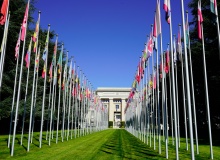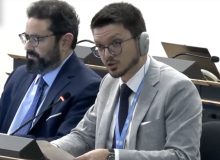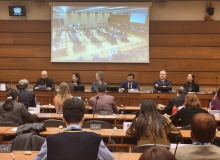


Most Siberian northern people do not yet have a Bible translation in their own language, nor has a corresponding religious language been developed. Christian concepts can, therefore, only be communicated to a very limited extent.

The latest update from the Observatory of Religious Pluralism reveals a growing presence of religious minorities within Spain's increasingly pluralistic religious landscape.

Upholding the worth and dignity of all human beings is hard work, but it is an essential part of our responsibility to represent Jesus in a hurting and divided world.

The initiative seeks to raise awareness of religious diversity in the city through open days and various activities organised to present their beliefs.

The morning show of Antena 3 presented the growth of evangelical churches from a sensationalist perspective, without any context or the views of evangelical representatives.
.png)
In less than a week in September, public television broadcasts stigmatised evangelicals in both countries. How should we interpret this?

The World Evangelical Alliance urges Turkey “to engage in structured dialogue wit Protestants” and warns of the growing hate speech against Christians.

RTVE responds to the inquiry of the audience ombudsman following the controversy caused by their report on the “worrying” growth of evangelical churches in Spain. “We take note of the mistake”.

A news programme on public television presented a biased and manipulated view of the reality of evangelicalism in Spain.

A report from the Ibero-American Missionary Cooperation Congress (COMIBAM), which gathered over 1,600 evangelicals from 25 countries in Panama City.

X. Manuel Suárez, from the Spanish Evangelical Alliance, participated in the General Assembly held in Rome, which addressed, among other issues, the role of dissident minorities in society and abuses within evangelical churches.

Evangelicals submit a report to the UN Human Rights Council, denouncing “cases of abuse of religious freedom, political rights and racism” in Bulgaria.

As the Evangelical Alliance United Kingdom we are vehemently opposed to this bill and communicated as such. We are speaking with MPs and write submission to the parliament committee.
.jpg)
Members of different churches belonging to the Sudan Council of Churches were arrested when they were on their way to a thanksgiving prayer meeting of a body known as the Inter-Church Committee.

“Religious freedom gives independence, reduces harassment and acknowledges societal acceptance”, says the UN special rapporteur on FORB at an event organised in Geneva.

The federation of Spanish municipalities seeks to bring awareness-raising, training and dialogue with faith groups in local contexts to Europe. It is a two-year EU-funded project in collaboration with universities.

A recent study highlights the rise of atheism among young women. Among those under 30, women are now more likely than men to be atheists, which is exceptional.
.jpg)
“Due to the threats, many Christians refused to stand as witnesses in court”, says one of the residents who filed a complaint. 11 more persons accused of blasphemy have lost their lives in the past 18 months.

The coalition led by prime minister Narendra Modi still has a majority but failed in its expectations after losing 67 seats. “For many Christians, the loss brings a sense of relief”.
The US International Commission on Religious Freedom warns in its annual report that several governments have engaged in the repression of religious minorities.

The world’s most populated country is in the midst of a key general election. “People are afraid that there will be no more elections afterwards”, says an evangelical.

A month after the attack on a Christian colony in Faisalabad, Imran, a Pakistani Christian, analyses the situation on the ground. “Churches fear a repetition”, he says.
.jpg)
Christians are against desecrating holy books, says Olof Edsinger, leader of the Swedish Evangelical Alliance. But “something is terribly wrong when totalitarian regimes are trying to force us to abandon our hard-won human rights”, he adds.

In September, MAI-Europe organises an event for Christian authors and content creators in the Balkans. Anna Shirochenskaya explains why it is important to strive for excellence in writing.

42% of young people do not consider themselves religious, finds the newest official survey. Islam is clearly on the rise.

Las opiniones vertidas por nuestros colaboradores se realizan a nivel personal, pudiendo coincidir o no con la postura de la dirección de Protestante Digital.